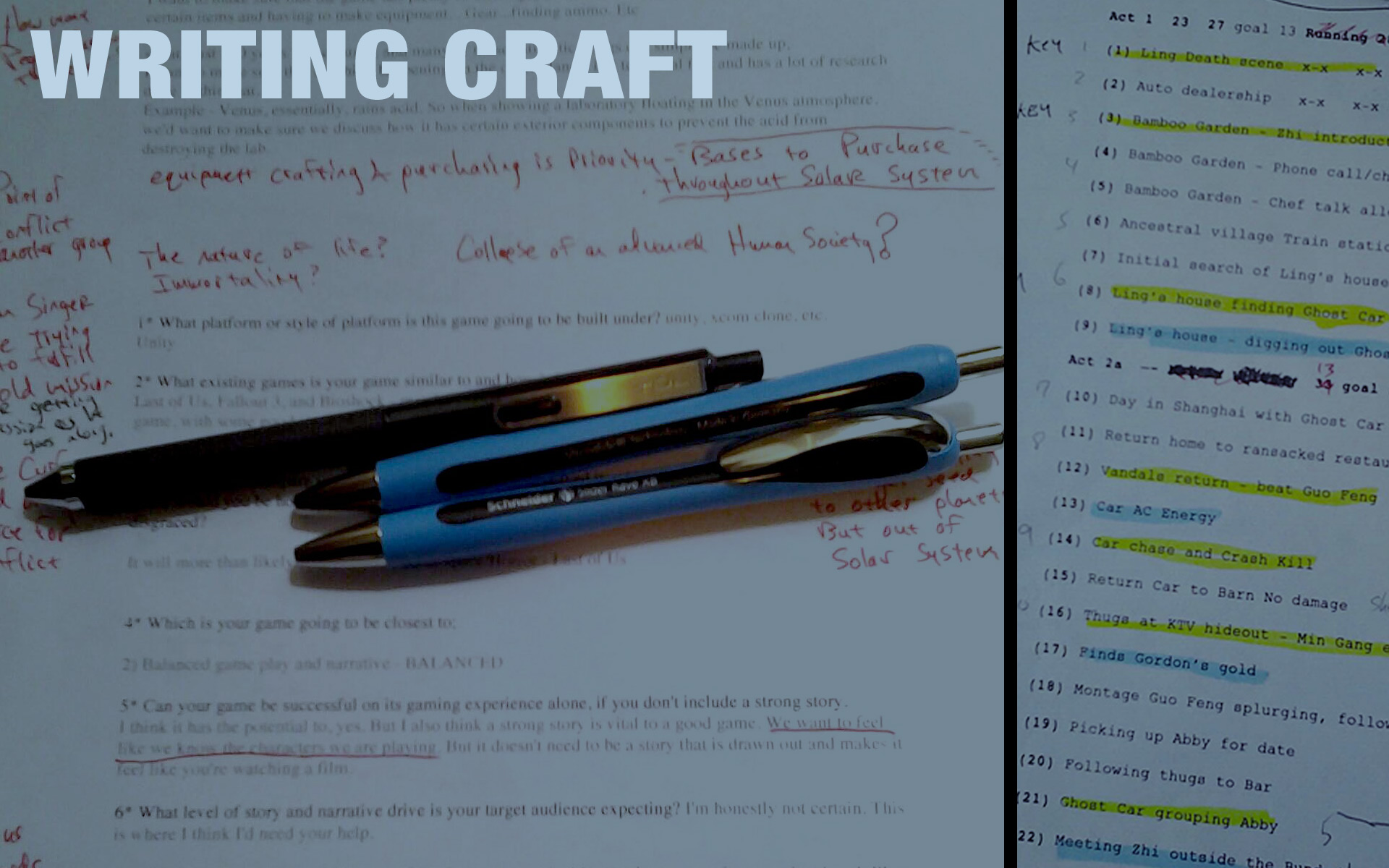Create better stories.
Write better scripts.

Or grab one of his books on the way out;
Storycraft for Comics
Writer's Guide to Comics
Samurai Onryo
Crashing Eden
Introduction
- Story Potential – Genesis of All to Come <--- Everyone start here!
Discovery and Structure
Advice on beginning your journey.
- Comic Book Titles and Dangerous Misnomers
- High Concept or Gimmick Writing
- Moving Past the Conceptual Stage
- The Importance of Concept
- Understand this piece of Art to be a better Writer
- Comic Book Writing Fundamentals
- Most Important Parts of Writing
- Plot Points
- Preparation – TIP
- Where do you Start – TIP
- Know Your Story
- How many pages of script is my outline?
- Loglines: is my story any good?
- Character Flaws
- Does Your Story Have a Pulse?
- Choosing Your Best Comic Concepts
- Are you working on a Phantom Story?
- 3 Act Structure-Friend or Foe?
- Master Theme
- Discovering Your Story
- Outline Basics
- The Best Way to Name
- Stories That Matter
- Character Profiles
- Streamline your Outline
- More on Master Theme
- Gravity of the Story
- Goals NOT Problems
- Pitch your Climax
Story Fundamentals
The cornerstones of story.
- Promises Conventions Obligatory Scenes and Genre
- How Many Acts – TIP
- Story Checklist
- A Cornerstone of Good Story – TIP
- Genre Masquerading As Theme – TIP
- Tone, Mood, Style and Genre
- Character Trifecta
- Ensemble Casts
- Creating Characters That Stand the Test of Time
- Writing Solid Villains
- Master Theme, Secondary Themes and Character Arcs
- Surprise and Foreshadowing
- Fix your Flashbacks
- Point of View and Captions
- The Super Trifecta
- Effective Subplots
- Hooks and Cliffhangers
- Scene Sizes
Story Mechanics
Building off story fundamentals.
- Maximize Your Turns
- Sunk Without Escalation – TIP
- Loglines are the Real Deal – TIP
- Character Arc Payoff – TIP
- Scene Selection Part 2: Only Your Best
- Scene Selection and Narrative Drive
- Threat of Violence
- Story Arcs
- Combat Micro-Scenes
- Dramatic Narrative Emphasis
- Delayed Inciting Incident
- Pacing Primary Escalation of Violence and Action
Script Execution Technique
Specific methods on building out scripts.
- Anger is NOT Conflict
- Better Characterization
- Effective Full Page Art
- RIP We See
- Forced Character Goals Kill Narratives
- Stop Storyboarding Your Scripts
- Standard Format Documents
- Barren Dialogue
- Panel Descriptions
- New Writers IGNORE Comictography
- Beware the False Subtext of Profanity
- The Secret Turn Equation – TIP
- Unnatural Exposition – TIP
- Camera Direction a Dangerous Weapon – TIP
- When in Doubt Add Conflict – TIP
- Highlighting Minor Characters – TIP
- Practical Editing – TIP
- Stop Relying on Dialogue – TIP
- Don’t Center Stage Symbolism – TIP
- Comicbook Script Format – TIP
- Always Drive Forward – TIP
- Show it Don’t Tell it – TIP
- Don’t Focus on Plot – TIP
- Kill your Passive – TIP
- Numbers in Dialogue – TIP
- Introducing New Characters-the Details
- Fight Scenes that Resonate
- Kill Phone Calls and Texts – TIP
- Don’t Skim Details – TIP
- Comic Writing Crimes (*updated* 1/20)
- Make SFX Matter (*Updated 8/19*)
- Screenplay Sloppy Sound Effects
- Contradictions indicative of Poor Visualization – TIP
- Emotional Context and Visual Writing Wins Every Time – TIP
- Avoid Subtle Action Sand Traps – TIP
- Cut your Character Motivations – TIP
- Accents in Comics
- Loose Vs. Thin
- Cut Your Entrances (and exits) – TIP
- Does Format Really Matter?
- Off Panel Bubble Direction – TIP
- STOP Zooming – TIP
- Kill Your Continuity Panels – TIP
- Always Use Courier! – TIP
- Beware of Panel Dopplegangers – TIP
- One Face, One Emotion – TIP
- Pacing Dialogue to Reveals
- Breaking Bubbles – TIP
- Repetition, Enemy and Ally
- Comic Writing Trends
- Long Shots, Short Detail – TIP
- Moral Message vs. Saying Something – TIP
- Name your Red Shirts – TIP
- Opening Scenes
- Strikethrough – TIP
- Full Page Art – TIP
- Cuts and Transitions
- Pass the Passive Writing
- High and Lows – TIP
- In Media Res (*Updated 12/19*)
- Anchoring Sound Effects
- On the Nose
- Showing Not Telling
- A Screenplay is not a Comic Script
- Don’t Use Captions as a Crutch
- 10 Core Rules to Writing Comics
- Dual Name Characters
- Sample Scene Breakdown
- Visualizing Panels
- Talking Slick, Hip and Breaking the 4th Wall in Panel Descriptions
- Double Page Spreads
- A Lesson in Visual Writing
- Comic Book Script Template – [Download]
- Writing Natural Dialogue
- Engaging the Reader in 22 Pages
Process
Broader discussion of technique.
- Creating Covers
- Situational Narratives and One Beat Concepts
- Edit or Rewrite
- Story Potential Assessment
- What Drives Your Story
- Verifying Your Concept
- Finishing a script
- Structure from Story Notes
- Beware of Beta Readers
- Mary Sues and Marty Stus
- Cowriting vs Hiring A Writer
- Plot Kills. Story first.
- How to Work With an Editor
- Talking Head Dopplegangers – TIP
- Talking Heads Kill Comics
- Recognize Split Narratives – TIP
- Editors Improve your Work – TIP
- Try to Break Your Story – TIP
- Actions Over Words – TIP
- The Strength of Weak Points – TIP
- Effectiveness In Expression – TIP
- Meet Your Deadlines – TIP
- Effective From Page 1 – TIP
- Works in Star Wars But NOT for You – TIP
- Environment Matters – TIP
- Every Gap is Not a Plot Hole – TIP
- Character Design is Trivial – TIP
- Damn the Prologue, Full Speed Ahead – TIP
- Every Story is Two Stories – TIP
- Wrong or Right in Comic Writing – TIP
- Steps to Create – TIP
- Ideas are Cheaper than Dirt – TIP
- Editors Make it Better
- Sacrifice your Ego for Story
- Homeless Guys Have an Opinion Too – TIP
- Real world premises – TIP
- Mini-series Outline – TIP
- Start With Your Second Act
- Works in the Movies, Not in Comics
- Editing Page Weights
- Aim Small – TIP
- Criticism – TIP
- Bad Aliases First – TIP
- Writing Workload – TIP
- Shower with your Theme
- Send Your Characters Out For Coffee
- Dialogue During Action
- Effective Prologues
- 5 Tips for Writing Female Protagonists
- Works in the Movies NOT in Comics Part Two
- First and Last
- DON’T Kill Your Darlings
- Writing to Strengths and Weaknesses
- Fictitious Terms and Exotic Proper Names
Economics of Comics
The business and financial side of comics (and writing).
- Maxiseries and Graphic Novels with Less Money
- Artificial Intelligence in Indie Comics – NSFW adult content
- Economic Breakdown The Man Who Died Twice
- Kickstarter for Comics Part 3 – Almighty Algorithms
- Kickstarter for Comics Part 2
- Work For Hire
- Comic Page Rates and Creator Budgets – UPDATED
- It’s hard to FIND a professional but easy to BE ONE
- Business Structure For Comic Professionals
- How to Hire an Editor
- Not Getting Screwed By Publishers
- Getting Ahead as a Comic Writer – TIP
- A Simple Contract Truth – TIP
- Business or Passion – TIP
- Bad Business Strategy – TIP
- Stick to your Strategy – TIP
- More Tips on Hiring Talent
- Size Matters. Stay Small. – TIP
- Not Getting Screwed by Contractors
- Know Your Audience – TIP
- Pitching to Publishers – TIP
- Hire the Best Editor You Can Afford – TIP
- Portfolio Tips – TIP
- Long Term Success
- Working for Free and Being a Shmoo
- Hiring Good Comic Artists with Less Money
- The Thousand Dollar Page Rate
- Kickstarter for Comics
- How to Find an Artist for your Comic Script
- How to Find Comic Writing Work
Miscellaneous
Everything else.
- You Have One Year To Finish
- Movie Reviews that Don’t Suck
- Follow the Right Advice
- Visual Direction and Dialogue Punches
- What kind of Brick Layer are you?
- UPDATE – October 1
- UPDATE – Mid September 23
- How to Build Writing Confidence
- Surviving in the Age of AI
- Removing Social Media
- Kickstarter for Comics Part 3 – Almighty Algorithms
- Are we running out of stories?
- Kickstarter for Comics Part 2
- It’s hard to FIND a professional but easy to BE ONE
- Writing Contest Results
- Famous Writer Scripts Teach Nothing
- Successful Cowriting
- Copyright and Wrong
- Comic Storyboards – [Download]
- A Better Way to Pitch
- The Privilege of Writing – TIP
- You Can Do Better – TIP
- The Necessity of Enjoying the Work – TIP
- How to Get Started in Comics
- You are a Mirror – TIP
- Overcoming Writer’s Block
- Other Books on Writing
- Character Designs
- Proper Pitching
- Timing – TIP
- Death of the Super Hero Genre
- Time Management and More
Write for a Living
TIME TO GO PRO?
Whether you're working on your magnum opus that needs your very best, or want to be a full-time professional writer and write for a living, the professional course has moved to a separate, secure site.
It includes over 40 articles and 130,000 words of writing technique and secrets! There is no better resource on creative fiction for the money, anywhere on the internet, or in print.
StorytoScript.com
The complete pro course includes articles like:
- The Ultimate Fight Scene
- Complete Character Arcs
- Scripting Unforgettable Panels
- Stories without Character Arcs
- Scripting an Outside Outline
- Symbolism
- Throughlines: Threads of the Story Tapestry
- Contracts 101 – [Download]
- 12 Tips for Spectacle Scripts
- 6 Things Done Best In Comics
- Comic Pacing Decompression and Compression
- The Cost of Making Comics
- Conversation Vs. Dialogue
- Outline Development – (*updated*)
- Character Personality
A true writer's thirst for knowledge, process, and insight never ends.
If you appreciate Nick taking the time to teach what he knows, consider:
* Buying him a coffee.
* Sharing this page and links to the articles on your social media.
* Buying one of his books.
Storycraft for Comics
Writer's Guide to Comics
Samurai Onryo
Crashing Eden
* Directly mentioning this page to a friend or colleague.
* Leaving a comment or dropping a review.
* Joining his mailing list.
* Signing up for the monthly Professional Membership.
